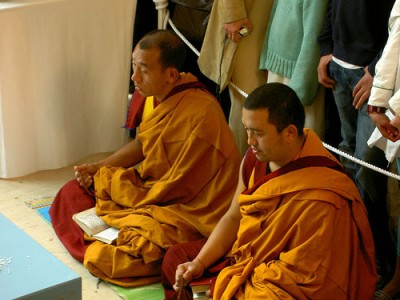What happens to the brain if you spend 44,000 hours in focused meditation?
This is a question Richard Davidson and his neuroscience team asked. To answer it, they took experienced Tibetan monks to their lab at the University of Wisconsin, and took various scans of their brains. Is the Buddhist brain fundamentally different than the average?
Types of meditation
Buddhism includes various types of meditation, which can be grouped into three main categories: focused attention, where the aim is to focus on one object or sensation, to the exclusion of everything else; open monitoring, where the aim is to increase awareness of all perceptions, without focusing on anything in particular; and compassion meditation, where the goal is to produce an overwhelming and unconditional mental state of kindness to all things. These all have different effects on the Buddhist brain, as we’ll see.

Obligatory meditation image. (Johan Stigwall)
Focused Attention
As would be expected, focused attention meditation increases activation in the brain areas implicated in the control and regulation of attention, such as the prefrontal cortex. The activation is higher in meditators with more experience, up to a point of about 19,000 hours practice. After 44,000 practice, there is an initial increase in activation, followed by a return to baseline. This means that after extensive training, it takes little effort for the attention to be controlled.
There are also differences in another brain area – the amygdala. This is an older part of the brain involved in emotion. Expert meditators have less amygdala activation than novices in response to emotional sounds. While sat in the MRI, novice and expert meditators were bombarded with distracting, emotionally provoking noises, such as a baby crying. Novices react to it, but while experts do hear the sound, they don’t react to it. They are less emotionally reactive to external events, and can hold their concentration in situations where in anyone else, the amygdala would be firing up so strongly that they would be powerless to resist its goal of redirecting their attention.
Open Monitoring
The overall effect of open monitoring is that the meditator is able to attend to all the stimuli coming at them, without getting ‘stuck’ on anything. They can just sit back and watch it all, or engage and disengage their attention as they please.
When under an EEG scan, the meditators were able to increase the gamma-band oscillations in their brain; these are usually quite weak, and difficult to detect. Gamma bands are important in attention and perception, but also in the transmission and integration of information across the brain. It is thought that this type of activity helps to integrate distributed neural processes into more ordered functions. There was also a change in the gamma bands when the monks weren’t meditating; showing that the ‘default’ setting had been altered.
Compassion Meditation
This type of meditation involves deliberately generating a state of unconditional compassion and kindness towards all beings, that saturates the whole mind. This is said to create more spontaneous acts of altruism in the meditator.
This was studied through fMRI scans. After thousands of hours of compassion meditation, the expert meditators were able to increase their empathic response to other peoples’ social signals. The brain area involved (the insula) is thicker in expert meditators than novices, and there was also greater activation in the areas associated with reading others’ mental states. In other words, by systematically creating a concern for others, the meditators are better able to process the emotions of others.
These have been quite revolutionary findings in neuroscience, showing that things like attention can be trained and develop, where previously they had been thought to be relatively fixed.
Recommended Reading:
Leave a Reply to Warren Davies Cancel reply